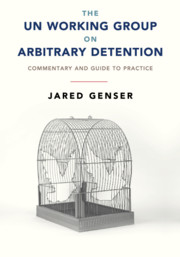Book contents
- The UN Working Group on Arbitrary Detention
- Reviews and Endorsements for The UN Working Group on Arbitrary Detention:
- The UN Working Group on Arbitrary Detention
- Copyright page
- Contents
- Figures
- About the Author
- Foreword
- Acknowledgments
- Abbreviations
- Part I. Background
- Part II. Individual Case Procedure
- Part III. Case Jurisprudence
- Part IV. Additional Case Studies
- 10 Mohamed Nasheed v. The Maldives
- 11 “Balyoz” or Sledgehammer Cases v. Turkey
- 12 Aung San Suu Kyi v. Myanmar
- 13 Mukhtar Ablyazov v. France
- 14 Yang Jianli v. China
- Table of Authorities
- Required Legal Materials
- Index
13 - Mukhtar Ablyazov v. France
from Part IV. - Additional Case Studies
Published online by Cambridge University Press: 20 September 2019
- The UN Working Group on Arbitrary Detention
- Reviews and Endorsements for The UN Working Group on Arbitrary Detention:
- The UN Working Group on Arbitrary Detention
- Copyright page
- Contents
- Figures
- About the Author
- Foreword
- Acknowledgments
- Abbreviations
- Part I. Background
- Part II. Individual Case Procedure
- Part III. Case Jurisprudence
- Part IV. Additional Case Studies
- 10 Mohamed Nasheed v. The Maldives
- 11 “Balyoz” or Sledgehammer Cases v. Turkey
- 12 Aung San Suu Kyi v. Myanmar
- 13 Mukhtar Ablyazov v. France
- 14 Yang Jianli v. China
- Table of Authorities
- Required Legal Materials
- Index
Summary
Since its independence from the Soviet Union in 1991, Kazakhstan has been led by President Nursultan Nazarbayev, a Soviet-era politician who has remained in the position by concentrating all political power in his office.1 No election in the post-Soviet republic has ever met international standards; in March 2015, Nazarbayev won reelection with 95 percent of the vote in a snap election widely panned by the international community.2 Beyond the complete absence of free and fair elections, the current Government prohibits citizens from enjoying their rights to freedom of expression, assembly, association, and religion. In the past few years, there have been major crackdowns on newspapers, which are the only source of independent news in the country, and many of the country’s prisons are filled with detainees serving sentences for peacefully assembling without a permit. Of particular concern to many states and international organizations is the pervasive use of torture in state-run detention centers.
Keywords
- Type
- Chapter
- Information
- The UN Working Group on Arbitrary DetentionCommentary and Guide to Practice, pp. 531 - 548Publisher: Cambridge University PressPrint publication year: 2019

